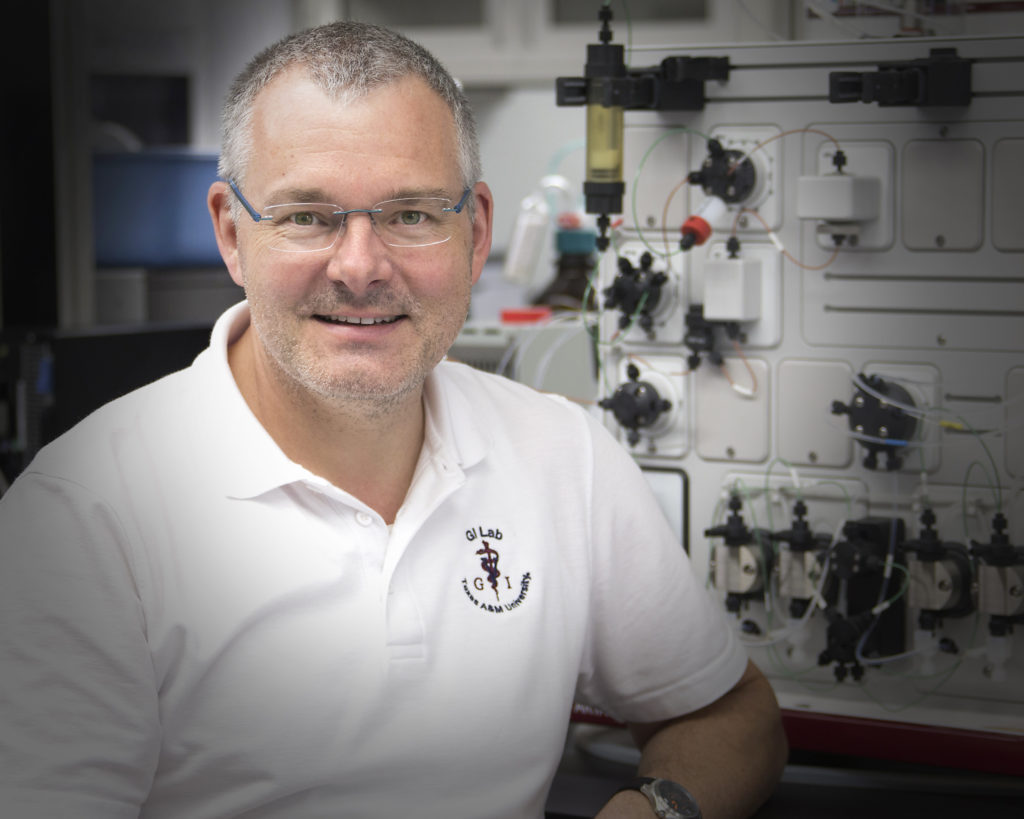CVMBS’ Steiner Named 2021 Regents Professor
Story by Jennifer Gauntt, CVMBS Communications

Dr. Jörg Steiner, a University Distinguished Professor within the Texas A&M College of Veterinary Medicine & Biomedical Sciences’ (CVMBS) Department of Small Animal Clinical Sciences (VSCS), is one of six Texas A&M University faculty members to be named a 2021 Regents Professor.
The designation, the highest honor bestowed by the Texas A&M System on faculty members, recognizes those whose distinguished performance in teaching, research, and service is considered commendable for their impact on their institution or agency, as well as on the community, the state, and/or at the national and international levels.
“Texas A&M University and their entire leadership have supported our work at the Gastrointestinal Laboratory (GI Lab) for over 20 years and it is such a great honor to be recognized as a Regents Professor by the Texas A&M System,” Steiner said. “To be included in such a distinguished group of faculty members is truly humbling and serves as an inspiration to continue the work we do.”
A small animal and comparative gastroenterologist, Steiner came to Texas A&M in 1997 as a graduate research assistant. After earning his Ph.D. from the CVMBS in veterinary pathobiology in 2000, he joined the faculty as a clinical assistant professor and co-director of the Gastrointestinal Laboratory. In 2005, he was named director of the GI Lab.
He attained the rank of full professor in 2011 and in 2019 was named a Texas A&M University Distinguished Professor. He also holds the Dr. Mark Morris Chair in Small Animal Gastroenterology and Nutrition within VSCS.
“In his 24 years at Texas A&M University, Dr. Steiner has distinguished himself as a prolific researcher and an outstanding educator whose impact extends well beyond veterinary medicine; the development of diagnostic tools and research being conducted every day in his GI Lab have made him one of the most recognized and respected veterinary clinician-scientists in the world,” said Dr. John August, CVMBS dean. “This honor is very well-deserved and reflects the pride we feel in Dr. Steiner.”
Steiner’s scientific contributions and his laboratory impacts the health of hundreds of thousands of animals, their families, and referring veterinarians per year, through testing and professional consulting.
Among his most notable accomplishments was the development of the pancreatic lipase immunoreactivity (PLI) test, a highly sensitive and specific tool used for the diagnosis of pancreatitis in both dogs and cats, for which he was awarded a worldwide patent in 2005; in the commercialization process, Steiner and IDEXX created the first patient-side test for PLI in cats and dogs, and today, millions of PLI tests are performed through IDEXX.
“Pancreatitis is an exceedingly common GI disease in dogs that, prior to Dr. Steiner’s discovery, was challenging to diagnose and, therefore, not possible to reliably treat or study,” said Dr. Jonathan M. Levine, VSCS department head, professor, and Helen McWhorter Chair. “Today, nearly every veterinary clinic in the world can offer this test to any client who brings in a pet and this revolutionized our industry and also paved the way for additional research and even treatment of pancreatitis.”
Steiner also developed the feline TLI test, which is now the recognized gold-standard for the diagnosis of feline exocrine pancreatic insufficiency world-wide, as well as several other diagnostic tests to assess gastrointestinal function.
In addition, he has helped to define the GI microbiome in the health and disease of many domestic species, which has led to changes in the way intestinal dysbiosis is diagnosed, and he leads in the annual diagnosis of almost 100,000 animals through GI Lab testing and professional consulting.
“Dr. Steiner is an internationally recognized veterinary clinician-scientist, who has revolutionized the field of gastrointestinal (GI) medicine through the development of key diagnostic tests and the performance of clinical trials,” Levine said. “The GI Lab he built and directs—which comprises a team of 50 faculty members, graduate students, postdocs, and staff—contributes to science, provides service to thousands of veterinarians throughout the world, and generates over $9 million in outside funds every year.
“In addition to his scientific and service-related contributions, Dr. Steiner is an outstanding educator,” Levine continued. “He is responsible for training residents in internal medicine (approximately 25 in his academic career), most of whom have gone on to contribute deeply to our profession.”
Steiner has also served the profession outside of the CVMBS.
He currently serves on the executive committee of the University Distinguished Professors and the advisory board of the Hagler Institute. He previously served on the board of the Comparative Gastroenterology Society for 13 years, first as secretary and treasurer and then as president.
He is also completing a term as president of the Small Animal Internal Medicine specialty within the College of Veterinary Internal Medicine (ACVIM) and has just been elected to serve as ACVIM president-elect, starting in January 2022, a commitment that will see him serve as president and chair of the board over the next four years.
Regents Professors function as role models within the Texas A&M University System and, at the request of their chief executive officer or the chancellor, may also serve in ceremonial and professional capacities during System-wide activities.
Steiner will carry the title for the duration of his employment within the A&M System; he will be recognized during a special ceremony held in conjunction with an upcoming Board of Regents.
###
For more information about the Texas A&M College of Veterinary Medicine & Biomedical Sciences, please visit our website at vetmed.tamu.edu or join us on Facebook, Instagram, and Twitter.
Contact Information: Jennifer Gauntt, Director of VMBS Communications, Texas A&M College of Veterinary Medicine & Biomedical Sciences, jgauntt@cvm.tamu.edu, 979-862-4216


